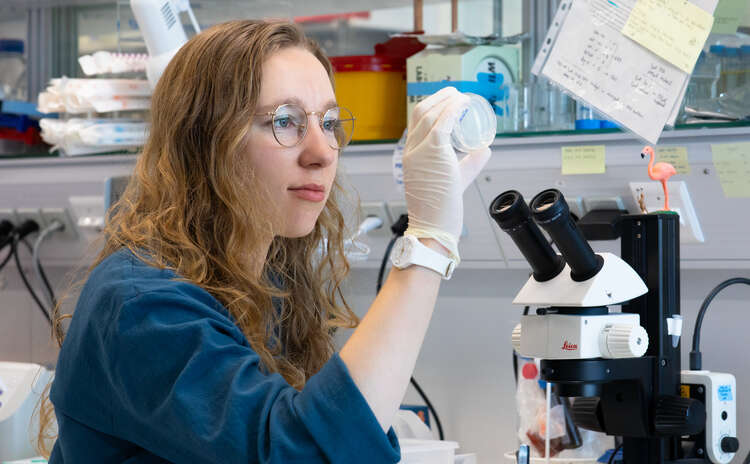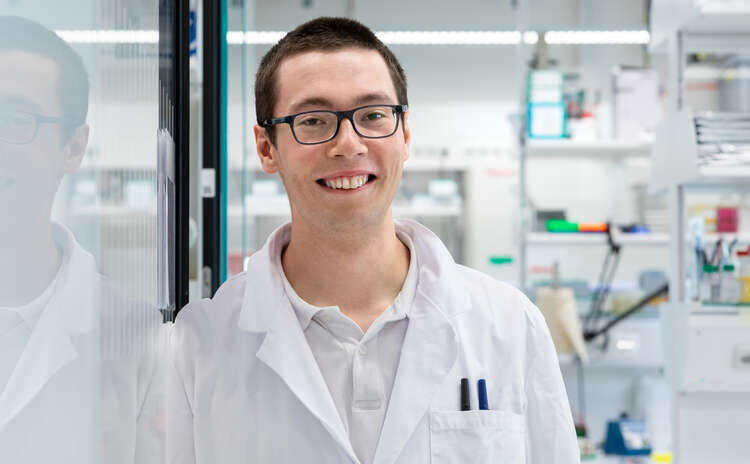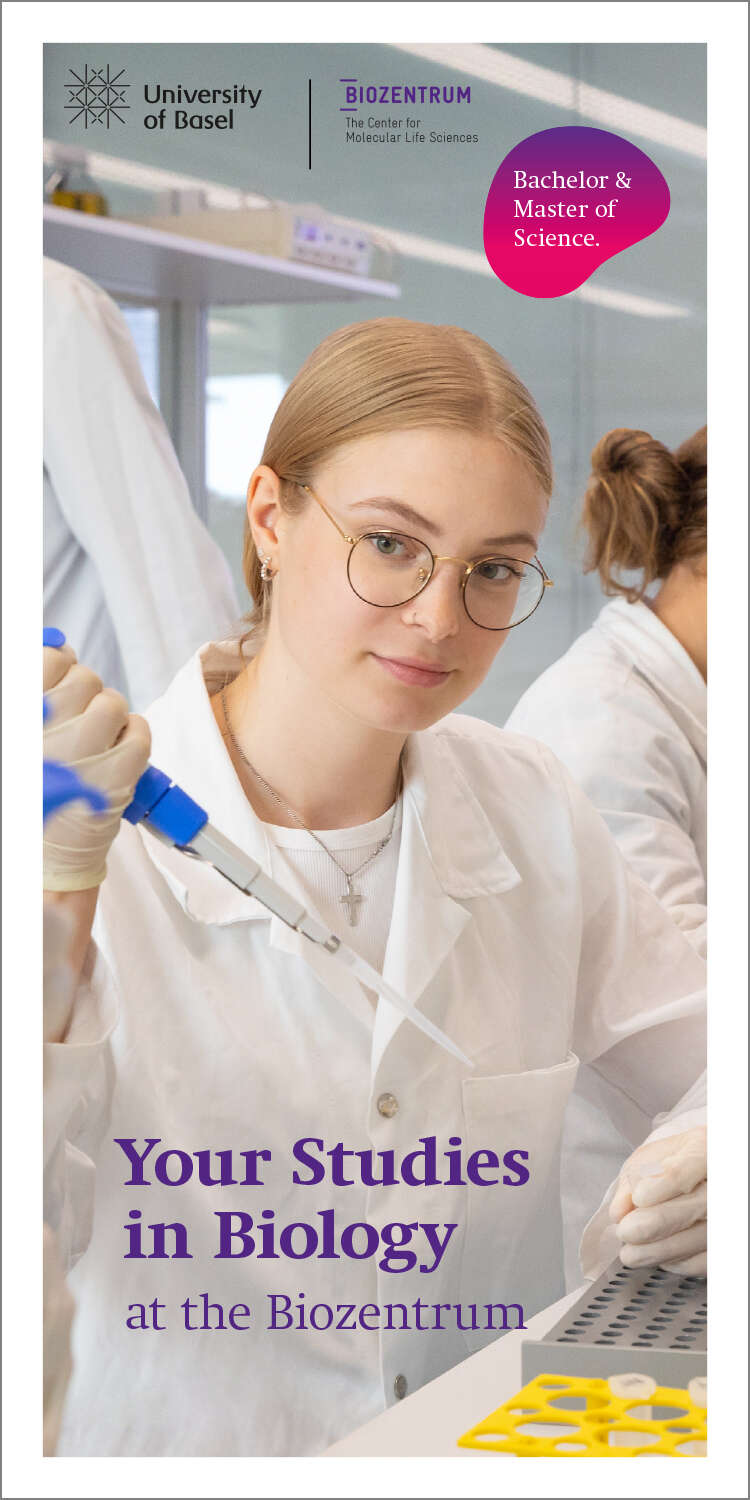Master of Science in Molecular Biology
The Master's degree program in Molecular Biology at the Biozentrum Basel gives you direct access to cutting-edge research in many of the relevant fields of research as well as to an international community of researchers from over 40 nations. The core of the Master's studies is an independent research project conducted under the guidance of experienced researchers.
The Biozentrum is one of the world's leading institutes for molecular and biomedical basic research and teaching. With our wide-ranging expertise, state-of-the-art infrastructure, intensive and practice-oriented mentoring, the international community and our close-knit networking, we offer an environment for your master's degree program that will promote your scientific, professional and personal development equally.
The major focus of the Master's degree program is your independent research project. This is conducted in one of the research groups at the Biozentrum, where you will learn and apply cutting-edge research techniques. You will supplement this practical part by attending lectures to deepen your knowledge in your field of specialization. Thereby, you can choose between biochemistry, biophysics,cell biology, computational biology, developmental biology, genetics, infection biology, microbiology, immunology, neurobiology and structural biology. Your Master’s thesis – the presentation of your research project both in writing and orally – along with a final examination comprise the completion of the course. The program generally requires three semesters.
You can find out first hand from two Master's students about their studies at the Biozentrum.

Palmer Bassett
She has a passion for the tiny worm C. elegans because it offers so many possibilities for discovery and because it brings together many interesting people. This and the fact that she wanted to work abroad brought her from the United States to the Biozentrum to do her master’s. More

Andrii Kharin
What he likes most about molecular biology is that he can work in the lab all day. This is one of the reasons why Andrii Kharin decided to do his master's degree at the Biozentrum. Here he can fully immerse himself in his master's project much longer than elsewhere. More
Research Fields
Research at the Biozentrum is dedicated to the central question of how molecules and cells create life – from the atom to the organism and from the physics of life to the dynamics of multicellular systems. Accordingly, the Research Fields the scientists are active in and the questions they tackle are very diverse: How do proteins form complex machines? How is the genome folded and read? How are cells organized to transport molecules and transmit signals? How do cells become specialized or cancerous? How does the body defend itself against pathogens? How do animals move, sleep and form memories? How do organisms develop and age? What are the theories and computational models that explain biological processes? What might be new strategies to treat diseases such as muscular dystrophies, Alzheimer's or cancer?
Characteristic for its research, is the strong emphasis on interdisciplinary collaborations within the Biozentrum as well as, on a local level, with the Departments of Biomedicine, Chemistry, Physics and Medicine, the Pharmacenter, the University Hospital Basel, the Swiss Tropical and Public Health Institute, the Swiss Nanoscience Institute, the Department of Biosystems Science and Engineering of the ETH Zurich in Basel, the Friedrich Miescher Institute for Biomedical Research and, on an international level, with renowned research facilities.
Master students also strongly benefit from these close collaborations, as the Graduate Teaching Program is jointly organized by various local partners.
Career perspectives
The Master of Science in Molecular Biology opens up diverse career perspectives. These include a research career at a university or in industry, work in the lab or at a school, in a patent attorney firm or in consulting, biocomputing or science journalism. With your knowledge of life processes, many doors open for you in medicine, biotechnology, the pharmaceutical and food industries, at universities or in state organizations.
Depending on the intended professional position, it may additionally be recommended to complete a PhD degree or to acquire other qualifications. For a career in research, a PhD is typically required. If you have any questions about your career entry or further education, you can contact the Student Advice Center Basel or the Career Service Center of the University of Basel.
For any questions concerning your studies, please contact the Student Office Biology (see below).
Key facts
Admission
The following degrees from the University of Basel allow direct admission to the Master’s Program in Molecular Biology: Bachelor of Science (BSc) in Biology with a Major in Molecular Biology and Bachelor of Science (BSc) in Computational Sciences with a Major in Molecular Biology. Comparable degrees from other Swiss or foreign Universities are approved by the Examination Board of the Faculty of Sciences.
Course Start
It is possible to start the Master’s degree program in both the spring and fall. The application deadline for the Fall Semester is April 30, and for the Spring Semester November 30. Further information can be found here.
Course structure
The Master of Science in Molecular Biology is a mono course consisting of a single core subject.
Lectures and Courses
Graduate Teaching Program
Duration of study
3 semesters
Language
English
Credit points
Credit points (CP) are awarded for successfully completed course work, in accordance with the European Credit Transfer and Accumulation System (ECTS). One credit point corresponds to a workload of approx. 30 hours. Evidence of the achievement of 90 CP is required for the award of a Master of Science in Molecular Biology.
- Master thesis 50 CP
- Master’s examination 10 CP
- Lectures and courses 30 CP
Further information
- Detailed information: www.bio.unibas.ch
- The University of Basel organizes an information event for prospective master’s students.

click to download leaflet
Bachelor & Master of Science


